
Gorky Left Yerevan without Saying Goodbye
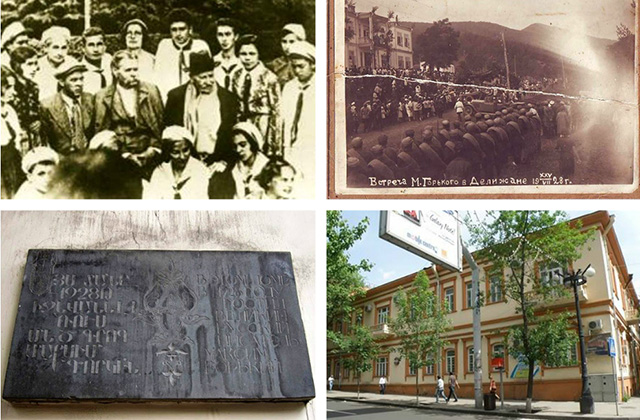
There is a nice, old-fashioned building in the center of Yerevan—Abovyan Street, on which there is a signboard, “Russian famous writer Maxim Gorky stayed in this house in 1928.” I used to hear allegations that Gorky didn’t stay in that apartment at all, however, as it was planned for him to stay there overnight, for this reason the signboard was later added. However, the reality edifies something different. And not only regarding the signboard.
In 1928 the unexpected news spread all over the country, “Gorky is coming to Armenia.” The revolution singer and petrel, associate of Lenin and Stalin, number one writer of the soviet period was to visit the Armenian land. According to official information, in the morning of July 25 Gorky was to head from Tbilisi to Gharakilisa (Vanadzor). President of the Council of Peoples Commissars S. Ter-Gabrielyan, officials A.Mravyan and R.Dashtoyan speedily headed for Vanadzor to welcom him. It was a rainy day, however, at dawn an immense crowd gathered at the railway station to greet him—officials, writers, railway workers, representatives of trade unions, Komsomol members and pioneers.
The train arrived in the platform with a strong whistle. People welcomed him with stormy applauses and “hurrahs.” Door opened. Everybody was waiting impatiently. However, Gorky wasn’t there. Minutes passed. No movement from the wagon was observed, nobody came out. Thus, they decided to clarify what was going on. Writer Vahram Alazan describes the snapshot after the confusion, “We enter. There he is, calmly drinking tea with coppery red face turned. Outside—excitement and impatience. Inside—calmness and indifference.”
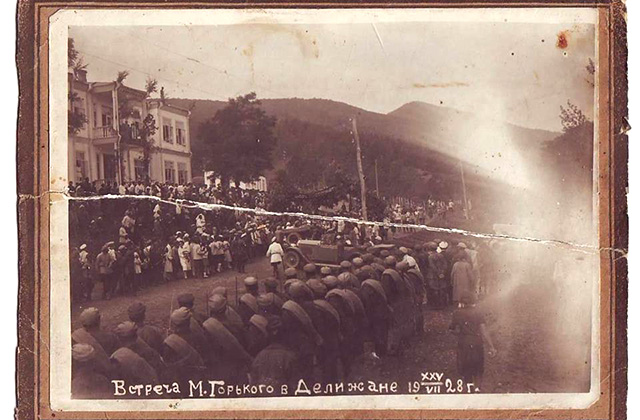
Maxim Gorky’s arrival in Dilijan
There were insulting shades in this behavior, however, somebody decided to attribute this to Gorky’s exclusive modesty, and the crowd took that bait, and when he finally got off, enthusiasm and joy of the crowd blasted in the air. Aleksey Makismovich got in the car and was taken to the rest house from the station. The holiday-makers took a picture of him, and the gardener gave two big bouquets to the writer. Then on his way to Dilijan Gorky had a short stop at the pioneer camp near Vardanlu village.
There was festive and solemn mood in Dilijan as well. The troops were standing in a row, locals and guests were waiting for him. Welcoming meeting took place before the new hotel building of the city. After speeches Gorky had a short walk and ordered to set off. Sevan was ahead. Then he made the following note in his travelogue,
“In the field of Dilijan one of the friends said in a half-voice:
-Turks massacred lots of Armenians here.
-Why remembering about that in such a nice place, – was the reply.
Yes, it’s amazing. Seems like mountains hug and are keeping the field with love and tenderness of living creatures.”
Gorky admired Armenia, but not with Armenians of new times, who attempt to bypass “inconvenient” facts of the past. In his notes the writer was ironically calling those people “Mr. humanists, idealists and guardians of culture,” professed values of whose were grounded on cynicism. And now he was to see villages of new times and their inhabitants, extreme poverty of whose shocked Gorky. When they stopped in Yelenovka (Sevan City), he was taken to observe the Lake. He got acquainted with experiments and scientific works on fish-breeding, however for the honored guest his talks with the locals were indelible, who were living with a routine of middle ages and were unaware of the world developments.
On the second half of the day Maxim Gorky was already in Yerevan. Here an overloaded program was planned for him. First was the solemn session at the House of Culture, then the writer got acquainted with industrial and cultural life. At the Museum History he was impressed with parchment manuscripts, admired paintings of Martiros Saryan in the Gallery. Then the press reported, “After the breakfast proletarian writer Yeghishe Charents gave Maxim Gorky the translation of his “Yerkir Nairi.” Gorky thanked Charents and promised to write a letter about that book, which he started to read yet in Italy.
Gorky was accompanied to hydropower station, cotton mill, then to “oil-soap” plant. There is an amusing episode linked to that visit. In the plant he was attentively watching every movement of the machine. He was taking cotton seeds, chewing, then he was taking the sawdust, oilcake and observing everything scrupulously. At that time decision was made to show him the Lenin’s bust made of soap. Gorky took the sculpture and suddenly told that quality of the soap was particularly interesting to him. That’s why he broke off a piece from the sculpture, watered it on his lips, then mashed in his hands. Meanwhile people were looking in astonishment how great leader of revolution was being defamed, Gorky went on actively explaining, that he simply was interested whether the soap was giving foam or not, from which the bust of his lovely friend was made.
One of the important places of his visit became “Ararat” wine factory, in the basements of which the admired guest abundantly tasted strong content of the barrels. They say that he pronounced his well-knows words in this very place, “Maybe it’s easier to get on Ararat mountain, than from the basement of “Ararat.””
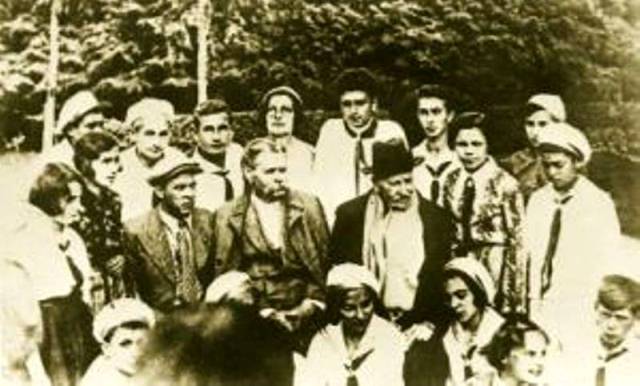
Gorky with Armenian pioneers
And exactly like that—drunk, Gorky participated in the great meeting, which was held in the city park with the presence of about ten thousand citizens of Yerevan. He was welcomed with stormy ovations, exclamations of happiness and widespread joy, Gorky delivered a speech, which, naturally, was praise of the Soviet country and revolution. And in the evening a big concert was organized for him in the park. Students of the Conservatory performed works of Spendiaryan, and the dance group showed Armenian Sasuntsi dance. This left indelible impression on Gorky. Then he would remember that scene with the following colors,
“The duduk plays hot, but its loud voice seems pleasant to the ear, the drum plays loud but softly and behind that music you see another—the music of beautiful movement of flexible human body, free play in the variegated waves of bright clothes. At the moments when slenderness of multi-head body movements was increasing, turning into golden and apricot-color storm, I was waiting that the chain of dancers would broke into separate circles, however, even in that storm they were keeping united dynamics of movements, increasing and deepening the impression of power and unity. I have never seen and couldn’t ever imagine an image of such a perfect unification, unity of many in one united action. In that ancient dance undoubtedly was hidden something symbolic, but I failed to reveal what it was—religious dance of priests or gift of warriors? Armenian dance of Sasuntsi people is a victorious dance of warriors.”
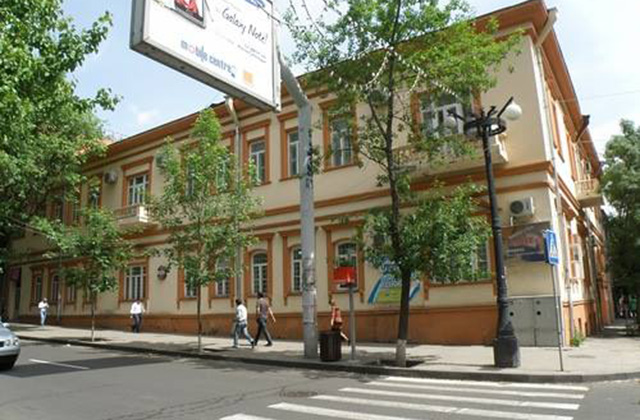
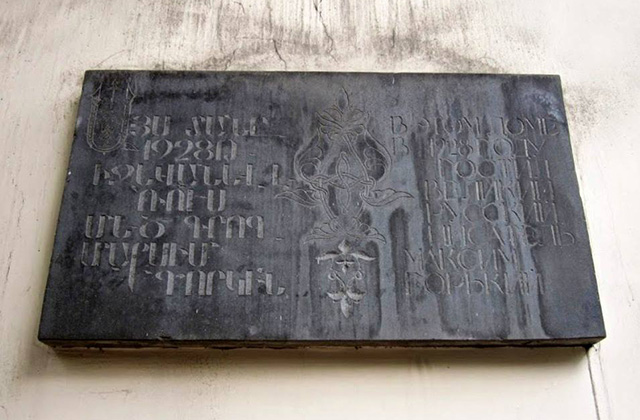
The house, where stayed Gorky
According to information provided by the press, at 9o’clock in the evening M.Gorky met employees of Association of Proletarian Writers of Armenia, Union of Worker Writers and press at the library after Myasnikyan. However, other sources edify that in fact, the meeting took place in the tea house of workers’ cooperation. Judging from reflections the talk wasn’t so lively and interesting—ordinary questions, ordinary answers. The writer, who was tired of day’s events, left the meeting like the worker hurrying home after work. He went to the house, where the signboard is attached now. And when the morning came, he was not in Yerevan any more. Gorky left for Tbilisi without saying goodbye.
As an epilogue, it’s worth attaching this story to the news published on “Soviet Armenia” newspaper relating to “Maxim Gorky in Armenia” documentary. It particularly read, “Maxim Gorky in Armenia” documentary may be considered partially satisfactory, as for rather unknown reasons cadres of his stay in Yerevan are missing, for instance, visit to plants, hydropower station, museum. Finally, the great meeting organized in the Park of Communards with the participation of Maxim Gorky, then solemn reception, ovations, which thousands of readers showed to the great writer. As for the missing cadres, it should be confessed that photos, structure of the footage and the dynamics are successful despite unfavorable conditions.”
By Hovik Charkhchyan























